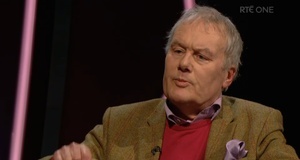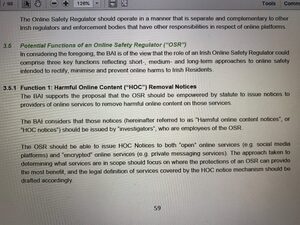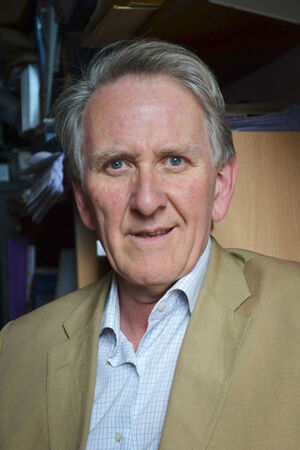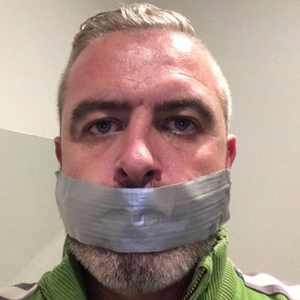
Kevin Myers
Today.
The Broadcasting Authority of Ireland released its latest decisions on broadcasting complaints.
In respect of a complaint made against RTE’s Morning Ireland – in which former Sunday Times columnist Kevin Myers was called a “holocaust denier” by one of the show’s presenters – the BAI upheld the complaint.
RTE has reported that it is considering a response to the finding.
BAI’s summary of the complaint – by Karl Martin – states:
The complainant states that one of the presenters on this programme described Mr. Kevin Myers as a ‘Holocaust denier’. The complainant states that this was an absurd claim based on a newspaper article written by Mr. Myers over eight years ago under a misleading headline that he didn’t write.
The complainant states that Mr Myers took issue with the word ‘Holocaust’ on account of its Greek origin, meaning ‘destroy by fire’. He stated that there was no single Holocaust because it took many forms; Jews were shot in pits, beaten to death, frozen and starved to death, burnt alive in their homes and synagogues and gassed.
The complainant maintains that it is quite clear from the newspaper article that Mr Myers believes that there was a Nazi genocide of the Jews – he typically and pedantically takes issue with the word. The complainant adds that Mr Myers has written many times about the Holocaust and the suffering of the Jews and that it is ridiculous and offensive to label him as ‘Holocaust denier’. The complainant states that no senior member of the Irish Jewish community has called him ‘a denier’.
In support of his complaint, the complainant submits the following:-
a) A copy of a statement issued by the Jewish Representative Council defending Mr. Myers from, inter alia, the claim that he had denied the Holocaust in an article eight years ago.
b) A copy of the Guardian newspaper’s correction to its earlier description of Mr. Myers as a Holocaust denier.
c) A copy of The Times of Israel published defence of Mr. Myers by the Jewish blogger, Mr. Jonathan Hoffman.
The complainant states that despite all of the above, the broadcaster still claims that it was correct to refer to Mr. Myers as having previously written a column in which he “denied the Holocaust”. The complainant states that this is, to quote the Jewish Representative Council, “an absolute distortion of the facts” and is based on the selective use of certain phrases taken out of context.
RTE’s response to the BAI is summarised as follows:
“The broadcaster states that the references to Mr. Myers in this context relate to articles written by Mr. Myers for the Irish Independent and Belfast Telegraph newspapers in 2009. In reaction to commentary on the articles following Mr. Myers’ final Sunday Times newspaper column, the Irish Independent immediately removed the article in question from its website.
The Belfast Telegraph had not, at the time of replying to the complainant, removed its version of the article. These are quotes taken directly from the article:-
“There was no holocaust (or Holocaust, as my computer software insists) and six million Jews were not murdered by the Third Reich. These two statements of mine are irrefutable truths.” “It is an offence in Germany to say that six million Jews did not die in the holocaust. Very well then, I am a criminal in Germany.” “I’m a Holocaust denier.”
“The broadcaster states that these are Mr. Myers’ own words. He may have then qualified his headline statements by then writing that there certainly was genocide waged against the Jews by the Nazis, in what he describes as “one of the most satanic operations in world history.”
The broadcaster maintains that if he is being referred to around the world as a Holocaust denier, it is because he described himself as such.
The broadcaster refers to the contents of this article as unarguable evidence that the statement by the presenter that Mr. Myers had “previously written a column in which he denied the Holocaust” was accurate and fair, did not misrepresent Mr. Myers and was not in any way misleading to listeners.
In its decision to uphold the complaint, the BAI said:
“While noting that Mr. Myers had described himself as a ‘Holocaust denier’ in a typically provocative newspaper article that he had written, it was evident from the article as a whole that his description did not in fact amount to a statement denying the genocide of the Jewish people at the hands of the Nazi regime.
Rather, the article was a comment on how language is used and the criminalisation of individuals or groups who engage in Holocaust denial. In this context, the comments by the presenter were considered to lack fairness to Mr. Myers and both misrepresented his views in a manner which would likely mislead audiences as to his views. Accordingly, the complaint has been upheld.
Read the decision in full here
UPDATE:
Meanwhile…

George Hook
A complaint about comments made by George Hook last September on his then High Noon show on Newstalk has also been upheld.
On September 8, 2017, Mr Hook had made certain comments in light of a court case concerning a sexual assault.
Mr Hook said:
“But when you look deeper into the story you have to ask certain questions. Why does a girl who just meets a fella in a bar go back to a hotel room? She’s only just barely met him …. then is surprised when somebody else comes into the room and rapes her.”
“Is there no blame now to the person who puts themselves in danger? There is personal responsibility. You then of course read that she passed out in the toilet and when she woke up the guy was trying to rape her. There is a personal point of responsibility, because it’s your daughter and it’s my daughter.
“And what determines the daughter who goes out, gets drunk, passes out and is with strangers in a room and the daughter that goes out, stays half way sober and comes home. I don’t know … but there is a point of responsibility. The real issues nowadays and increasingly, is the question of the personal responsibility that young girls are taking for their own safety.”
The complaint to the BAI was made by Fiona O’Toole, who summarised her complaint as follows:
The complainant states that it was not appropriate for the presenter to blame an alleged
victim of sexual assault for the fact that she was raped. The complainant states that it is irrelevant that she chose to go back to a hotel room with one man; she should not be raped by a second.
The complainant expressing the opinion that the presenter believes that the victim is responsible for this assault is offensive and harmful. The complainant states that
nobody would suggest that men who are mugged walking down Grafton Street in Dublin are responsible for being mugged and it is not appropriate for the presenter to blame women (and their parents) for rape rather than the rapist and their parents for how they raised them.
Newstalk’s response to the BAI was…
The broadcaster states that the day following the initial broadcast, Saturday 9th September, the programme presenter and Newstalk issued an apology for the on-air remarks.
On Monday 11th September, the presenter, while on-air, issued a further, more detailed,
apology. The broadcaster states that an internal process within the station in relation to the comments was undertaken and, on Friday 15th September, it was confirmed that the
presenter had been suspended from his duties at the station while the process was
ongoing.
The broadcaster states that on the 22nd September it was confirmed that the
process which reviewed the circumstance that led to the presenter’s comments had
concluded and Newstalk confirmed that the presenter would be stepping down from his
lunchtime slot and would return in December when he will take on a new weekend show.
In upholding the complaint, the BAI stated:
“In the case of the programme that is the subject of the complaint, the Committee noted that it is aimed at an adult audience and the programme and presenter’s sometimes provocative style are well established and understood by the audience.
The Committee also recognises that it is permissible in broadcasting to deal with the question of personal responsibility in covering issues of crime and criminal behaviour. However, this topic was raised in the programme in the context of a then ongoing UK court case about rape and the issue of personal responsibility was described by the presenter as “the real issue” in this matter.
As such, the Committee considered that the manner and context of raising the issue of personal responsibility in the context of a specific case of alleged rape caused undue offence and there was a strong possibility of causing distress to audience members who might personally identify with this issue.
In considering this complaint, the Committee acknowledged that the broadcaster subsequently undertook remedial action and has accepted the substance and validity of the complaint.
It also noted that the presenter explicitly stated that he does not condone rape.
However, the broadcaster had a responsibility to take greater care to prevent the possibility of undue offence and harm, including taking timely corrective action where content is likely to have caused offence.
The Committee was of the view that the broadcaster had failed to take corrective action in a timely fashion, action which may have ameliorated the undue offence caused. Given this and given the content of the programme, the Committee has decided to uphold the complaint.
Decision can be read in full here
















